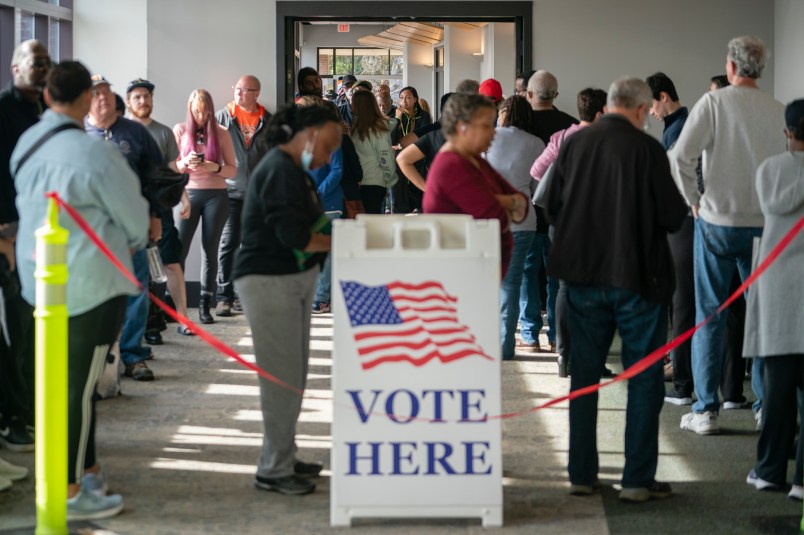The Republican-controlled Georgia State Election Board approved a rule last week, only a few months shy of the presidential election, giving county officials new authority over election certification — and potentially giving the board the ability to delay certification of election results in a state that served as a hotbed for conspiracy theories pushed by Donald Trump himself in 2020.
Election experts note that this change, which will go into effect in time for the upcoming presidential election, gives election deniers, fueled by baseless voter fraud claims, new grounds to delay certifying election results if Trump appears to be losing in the fall.
“At the core of these changes is the attempt for a power grab by the state election board, and they’re really looking to write their own rules for the election based on this new partisan majority that’s taking control of the Georgia State Election Board,” Megan Bellamy, vice president of law and policy at Voting Rights Lab, told TPM.
The rule change passed by the GOP-run State Election Board gives that very board — which is meant to hold a largely ministerial responsibility in the certification process, according to state law — the power to not certify election results until a “reasonable inquiry” into any discrepancies in the voting process at the county level has been conducted by election officials there. The problem is, the full text of the new rule does not define what constitutes a “reasonable inquiry.”
The rule states that the Georgia State Election Board can only certify an election “after reasonable inquiry that the tabulation and canvassing of the election are complete and accurate and that the results are a true and accurate accounting of all votes cast in that election.”
This vagueness in the rule, voting experts say, is a deliberate way to give election deniers more power to delay certification based on false claims over voter fraud.
Stephanie Jackson Ali, policy director of the nonpartisan New Georgia Project, explained in an interview with TPM that this newly passed measure is both a way to potentially keep an election from moving forward, but also as she notes, a way to “add fuel to the fire of the election deniers.”
“It has potential to allow those election deniers who have made it onto seats on election boards in our state to hold up a perfectly viable election to hold that up and to keep it from moving forward as pace as it should,” she added.
Three GOP members of the five-person board who voted in favor of the change were given a shout out explicitly by Trump at a campaign rally in Atlanta on August 3, only highlighting that the composition of the current board is itself a consequence of election denialism.
Trump called the three members who voted in favor of last week’s measure and have previously questioned the results of the 2020 election, Janelle King, Janice Johnston and Rick Jaffares, “pitbulls, fighting for honesty, transparency, and victory.” Later, King told CNN that although she is “appreciative of the president’s support” she is “not working on behalf of anyone.”
During the meeting when the new rule was adopted in a 3-2 vote last week, Johnson argued that the rule is designed to help the board only certify elections that have been conducted fairly — again, leaving what exactly that means ambiguous. It’s language similar to what Trump himself has used in recent months when dodging reporters’ questions about whether he will accept the results of the election in November: “All we want is honest elections. If we have honest elections in Georgia and we have honest elections in Pennsylvania, we’re going to win them by a lot,” Trump said just last week.
“Not all elections are certified,” Johnston said during the meeting last Tuesday. “There are ballot battles and there are elections that need to be addressed carefully, and there may be issues that prevent a board from certifying.”
“We’re not asking the board to do a full election audit or a forensic audit, we’re just asking for a reasonable inquiry,” she added.
The singular Democratic member of the board, Sarah Tindall Ghazal, in an interview with MSNBC, called the rule a “deliberate and coordinated effort to undermine the certification process.”
Although the new rule gives the board more authority to potentially delay certification by saying they now have the power to push for a “reasonable inquiry” into county-level tabulation processes, again, not defining what exactly that entails, it does not give the board power to refrain from certifying an election altogether. The vagueness of this new rule also means that the process will likely be applied inconsistently throughout the state.
“We have a process that has been understood to be largely ministerial,” said election integrity consultant David Levine. “We have a process that has largely been accurate, and we now are talking about a change being made close to the election that could substantially change how boards go about reviewing the certification results.”







You ever wonder about those criminals wherein you ask yourself, “Why couldn’t they spend that time and energy on something good and positive rather than dedicating themselves to crime?”
This is one of those stories.
The vagueness of this new rule also means that the process will likely be applied inconsistently throughout the state.
I guess that came from the Heritage Foundation’s “How to Create an Issue for the Federal Courts” brochure?
What do we do about this?
…because those have a nasty habit of just confirming that the vote counts were correct. Formless, unspecified, indefinite delay is much better than actual data. After all, facts are known to have a liberal bias.
Ratfuckers all the way down.